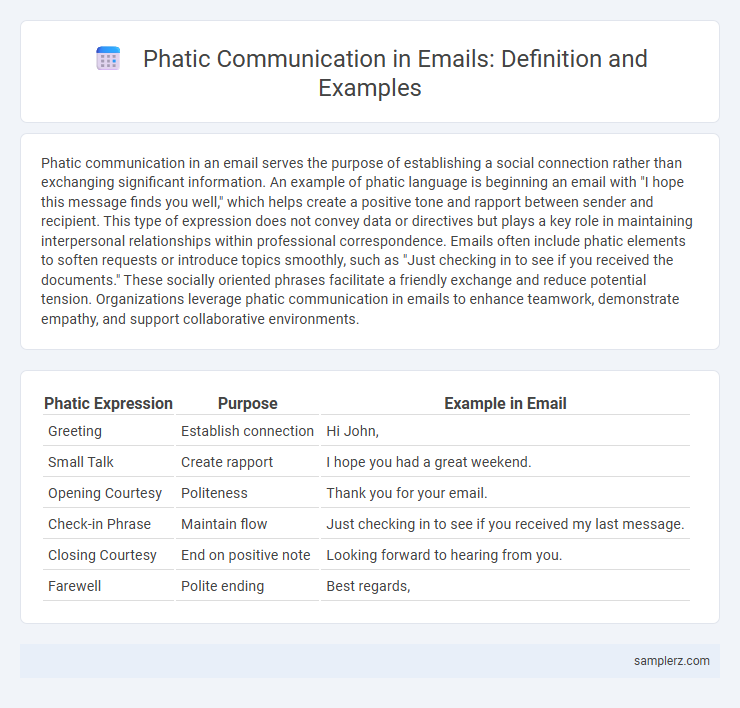Phatic communication in an email serves the purpose of establishing a social connection rather than exchanging significant information. An example of phatic language is beginning an email with "I hope this message finds you well," which helps create a positive tone and rapport between sender and recipient. This type of expression does not convey data or directives but plays a key role in maintaining interpersonal relationships within professional correspondence. Emails often include phatic elements to soften requests or introduce topics smoothly, such as "Just checking in to see if you received the documents." These socially oriented phrases facilitate a friendly exchange and reduce potential tension. Organizations leverage phatic communication in emails to enhance teamwork, demonstrate empathy, and support collaborative environments.
Table of Comparison
| Phatic Expression | Purpose | Example in Email |
|---|---|---|
| Greeting | Establish connection | Hi John, |
| Small Talk | Create rapport | I hope you had a great weekend. |
| Opening Courtesy | Politeness | Thank you for your email. |
| Check-in Phrase | Maintain flow | Just checking in to see if you received my last message. |
| Closing Courtesy | End on positive note | Looking forward to hearing from you. |
| Farewell | Polite ending | Best regards, |
Understanding Phatic Communication in Emails
Phatic communication in emails involves brief social exchanges that establish rapport rather than convey substantive information, such as greetings like "I hope you're well" or closings like "Best wishes." These phrases foster a sense of connection and politeness, enhancing the overall tone and receptivity of the message. Recognizing phatic elements helps improve email communication effectiveness by balancing professionalism with personal engagement.
Common Phatic Expressions for Email Openers
Common phatic expressions for email openers include greetings like "I hope this email finds you well," or "Thank you for your timely response." These phrases establish a polite tone and foster rapport without conveying substantive information. Using phrases such as "I trust you had a great weekend" or "Hope you're doing well" enhances interpersonal connection in professional communication.
How Phatic Language Builds Rapport in Email
Phatic language in emails, such as greetings like "Hope you're doing well" or closings like "Looking forward to your response," establishes a friendly tone that encourages positive interaction and connection. These seemingly simple, non-informational phrases reduce social distance and create a sense of warmth and approachability, which is essential for building rapport in digital communication. Regular use of phatic expressions enhances trust and facilitates smoother collaboration between colleagues, clients, and stakeholders.
Examples of Phatic Closings in Professional Emails
Common examples of phatic closings in professional emails include phrases like "Best regards," "Kind regards," and "Sincerely," which serve to maintain a polite and courteous tone. These expressions help reinforce social bonds without conveying specific information, ensuring the communication remains professional yet approachable. Employing such closings effectively supports positive rapport and smoothens ongoing email exchanges.
Phatic Communication vs. Informational Content in Emails
Phatic communication in emails serves to establish and maintain social connection, often through greetings like "Hope you're doing well" or closings such as "Best regards." This contrasts with informational content, which delivers the primary message, such as project updates or meeting details. Balancing phatic elements with clear information enhances rapport without sacrificing clarity in professional correspondence.
Culturally Appropriate Phatic Phrases for Global Emails
Using culturally appropriate phatic phrases in global emails enhances communication by establishing rapport and respect. Examples include greetings like "I hope this message finds you well" for Western contexts, "I trust you are doing well" commonly used in formal Asian correspondence, and "Wishing you a prosperous day" which resonates in Middle Eastern cultures. Tailoring these phrases to cultural norms facilitates smoother interactions and fosters positive business relationships.
Short and Effective Phatic Statements for Workplace Email
Short and effective phatic statements in workplace emails, such as "Hope you're well," "Good morning," or "Thank you for your time," establish rapport and create a polite tone without overwhelming the recipient. These brief phrases facilitate smoother communication by acknowledging the recipient's presence and setting a positive atmosphere. Utilizing concise phatic expressions enhances email efficiency while maintaining professionalism in corporate settings.
Avoiding Overused Phatic Expressions in Email Interaction
In email communication, avoiding overused phatic expressions such as "Hope you're doing well" and "Just checking in" can increase message clarity and engagement. Instead, personalized greetings or context-specific opening lines tailored to the recipient's recent activities foster stronger connections. Utilizing concise, meaningful phrases reduces redundancy and enhances the overall effectiveness of professional email interactions.
Balancing Formality and Warmth with Phatic Communication
In email communication, phatic expressions like "I hope this message finds you well" balance formality and warmth, fostering rapport without detracting from professionalism. Employing phrases such as "Thank you for your prompt response" maintains polite engagement while reinforcing collaborative tone. Strategic use of phatic language enhances relational dynamics, supporting effective and courteous interactions in professional settings.
Impact of Phatic Messages on Email Tone and Relationships
Phatic messages in emails, such as greetings and small talk, establish a friendly tone that fosters rapport and reduces perceived distance between correspondents. These seemingly trivial exchanges enhance trust and collaboration, promoting smoother communication and positively impacting workplace relationships. Consistent use of phatic language in emails signals attentiveness and respect, which strengthens professional bonds over time.

example of phatic in email Infographic
 samplerz.com
samplerz.com